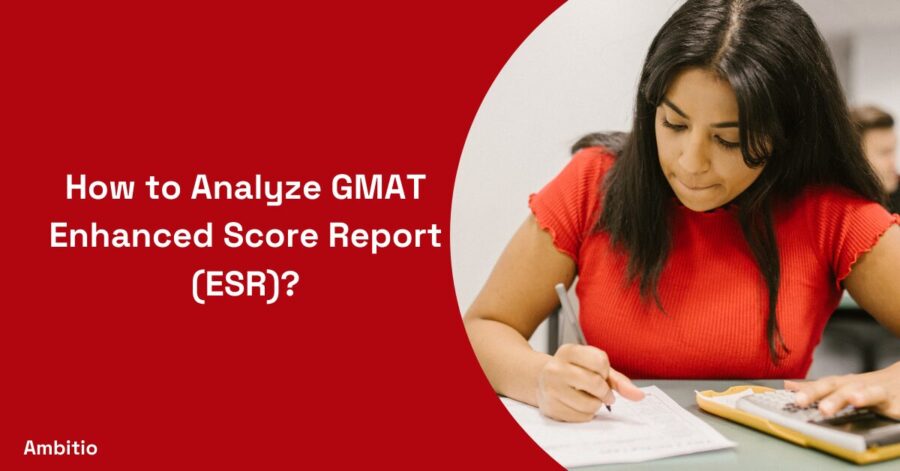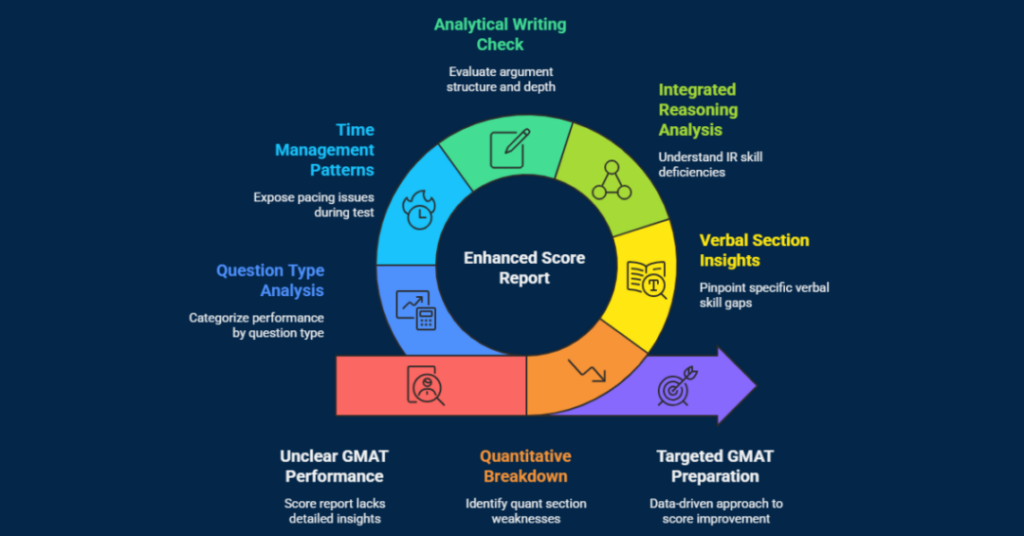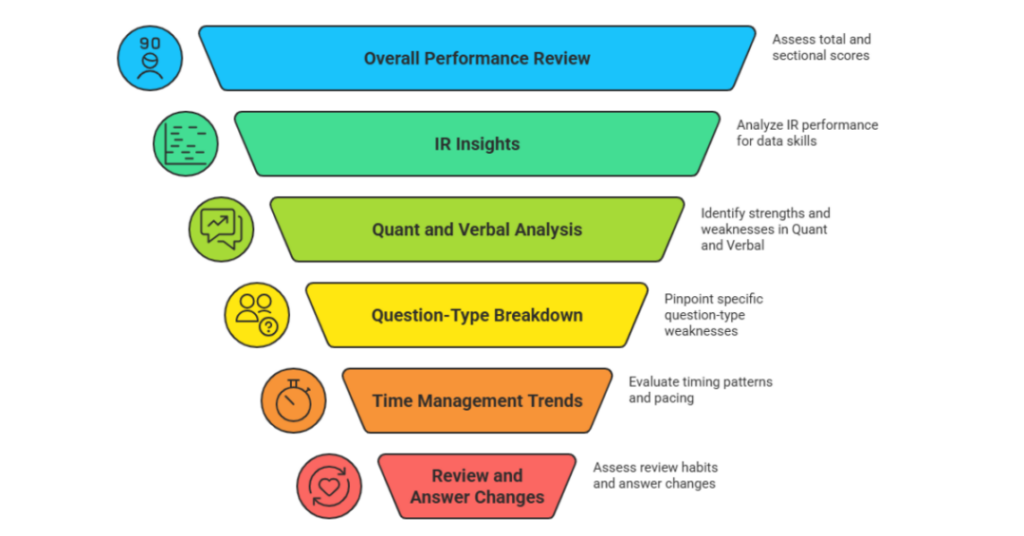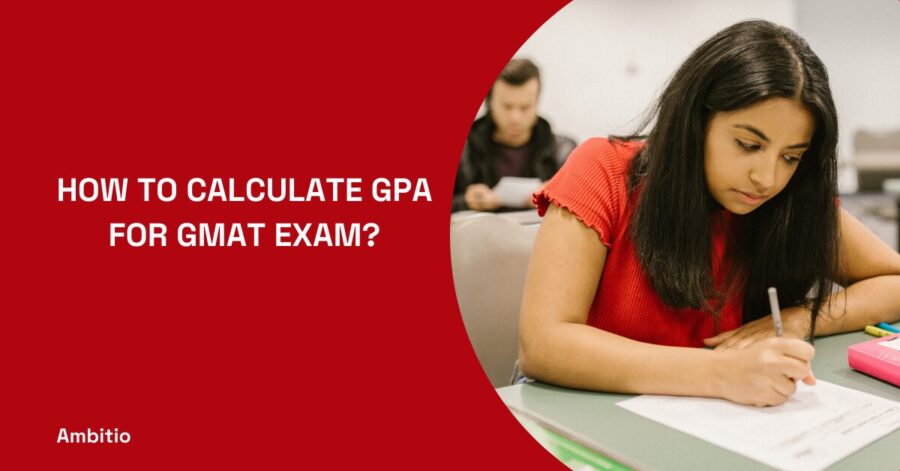8 September 2025
7 minutes read
How To Analyze GMAT Enhanced Score Report (ESR): The Right Way

Key Takeaways
- Know how to analyze GMAT Enhanced Score Report to identify weak areas and fix time management
- Read percentiles over raw scores to understand true competitiveness for business schools
- Target weak question types shown in ESR instead of over-practicing strengths
I’ve seen this pattern too many times: a student walks out of the GMAT exam with high hopes, only to be crushed by a lower-than-expected GMAT score. Then comes the GMAT Enhanced Score Report (ESR), a goldmine of data that 90% of test-takers misuse.
Instead of understanding why their quant or verbal score tanked, they skim through the percentile charts, ignore the average time per question, and continue prepping blindly. I can tell you from working with hundreds of MBA aspirants, this is exactly why people stay stuck in the same score band, no matter how many hours they put into GMAT prep.
What Exactly Is GMAT Enhanced Score Report (ESR)?
Think of the GMAT Enhanced Score Report (ESR) as the post-mortem of your GMAT test. Issued by GMAC, it breaks down how you performed on every section: quantitative, verbal section, integrated reasoning, and analytical writing, while exposing patterns in your time management, accuracy, and question type performance.

Unlike the one-line score report you see at the test centre, ESR actually tells you why you got the GMAT score you did. And trust me, business schools won’t see it – but you should, because it’s the roadmap for your next attempt.
Quantitative Section Breakdown
This isn’t just about whether you got a “good quant score.” ESR shows your percentile vs. other test-takers, the difficulty level of questions you got right/wrong, and the average time you spent per question. If you’re scoring high in problem-solving but low in data sufficiency, that’s a very different prep strategy than someone struggling equally across both. Most students never notice this split, and that’s why they waste months on the wrong type of quant prep.
Verbal Section Insights
Here is where ESR gets brutally honest. It tells you exactly how you performed in critical reasoning, reading comprehension, and sentence correction, not just your total verbal score. For example, if your accuracy in critical reasoning is below 40% but you’re strong in RC, you know the real problem isn’t “verbal” in general; it’s logic gaps. That’s how you save yourself from endlessly solving SC grammar drills you don’t even need.
Integrated Reasoning Performance
Most students brush this off because business schools “care more about quant + verbal.” Huge mistake. ESR shows whether your IR weakness is in multi-source reasoning, graphics interpretation, or two-part analysis. Guess what, these are the exact skills you’ll use in your MBA classroom and consulting case interviews. Ignoring IR is like skipping leg day at the gym: you’ll look fine on the surface, but it will catch up to you.
Analytical Writing Check
This section won’t make or break your MBA admission, but ESR still highlights how structured your argument was and whether you analyzed the issue deeply. If your analytical writing is consistently weak, it’s not about “essay skills”, it’s about your ability to organize thoughts logically, which will haunt you in b-school discussions if you don’t fix it now.
Time Management Patterns
One of the most underrated parts of ESR: average time per question. GMAC literally hands you the proof of where you panic, slow down, or speed-run. I’ve seen students who spend 3+ minutes on one quant monster, then guess the last 5 questions in a row. ESR exposes this, so you stop blaming “bad luck” and start fixing pacing with timed practice.
Question Type Analysis
This is gold. ESR categorizes your performance by question type: problem-solving vs. data sufficiency in quant, or critical reasoning vs. RC in verbal. You’ll immediately see if you’re consistently tanking one type. For example, a student of ours once scored 47 in quant but only 20% accuracy in DS. That’s not a “math issue”, it’s a strategy issue. ESR is the only way to spot this at scale.
How To Analyze Your GMAT Enhanced Score Report?
It’s not that hard, but it’s not that easy either. The ESR or enhanced score report looks simple on the surface, colorful charts, percentiles, average times, but the real challenge is knowing what those numbers actually mean for your next GMAT attempt. I’ve seen students stare at their ESR for hours, only to walk away with zero insights, and others pull out one or two data points that completely transformed their prep.

The difference lies in how you read it.
1. Start With the Overall GMAT Performance
Your ESR begins with your Total Score (200–800) along with Quant, Verbal, IR, and GMAT AWA scores. Each comes with percentile rankings compared to other test-takers.
- Don’t just look at your raw scores, percentiles show how competitive you really are.
- Use this as your baseline: which section drags your total score down the most?
2. Integrated Reasoning (IR): Spot the Subtle Leaks
The IR section shows percent correct, difficulty level, and average time per question.
- If you’re consistently spending 3–4 minutes on IR questions you still get wrong, you’re bleeding time.
- Weakness here often signals poor data interpretation skills, which also affect Quant and MBA coursework.
3. Quant and Verbal: The Goldmine of Insights
This is where ESR pays off. You get:
- Quant split: Problem Solving vs. Data Sufficiency.
- Verbal split: Critical Reasoning, Reading Comprehension, Sentence Correction.
- Accuracy, timing, and performance progression across test blocks.
How to use this:
- Low accuracy in DS but strong PS? That’s not a “math” issue, it’s a logic issue.
- Weak CR but strong RC? Don’t waste time drilling vocab; work on argument structure.
- If performance dips in later blocks, it’s pacing or stamina, not ability.
4. Question-Type & Skill Breakdown
ESR exposes your accuracy by question type and sometimes by difficulty.
- You’ll know if medium-difficulty questions are tripping you up, or only the hard ones.
- Spotting a consistent weakness (e.g., SC below 40th percentile) allows targeted prep, instead of blanket practice across all of verbal.
5. Time Management Trends
ESR shows your average time per question and progression across the test.
- Bad start: Overspending on the first few questions → anxiety issue.
- Bad finish: Guessing the last 5 in a row → stamina or pacing issue.
- Inconsistent timing: Spending too long on wrong answers → poor judgment under pressure.
6. Review & Answer Changes
Your ESR logs how many questions you reviewed and how often you changed answers.
- Changing correct answers to wrong ones? That’s self-doubt, not strategy.
- If reviews improve accuracy, great. If not, stop second-guessing yourself.
7. Turn Insights Into a Retake Strategy
Here’s the right sequence:
- Diagnose the weakest section or question type.
- Prioritize fixes that give the biggest score lift (e.g., improving DS from 30% → 60% can raise quant score faster than grinding PS).
- Plan targeted drills. Don’t “study everything again.”
- Practice with pacing in mind; replicate timing patterns.
- Track improvements with mocks or sectional tests before retaking.
How To Improve Your GMAT Score To Study MBA?
Most test-takers score lower than they expected, blame nerves, and then plan to retake the GMAT without changing anything. I’ve seen it hundreds of times. They walk away with a total GMAT score in the 600s, convince themselves it’s “good enough”, and later wonder why the admit email never arrives.
The truth is simple. A strong GMAT score is not about working harder, it’s about working smarter with the data GMAC already gives you.
1. Use the ESR Like a Consultant Uses a Balance Sheet
When you buy the ESR or enhanced score report, you’re not buying a receipt, you’re buying the most powerful tool GMAC offers. The enhanced score report tells you exactly where your score dropped, which section of the GMAT dragged you down, and how you performed while taking the GMAT across time. ESR shows your performance by question type and timing. If your quant score looks fine but your accuracy in Data Sufficiency is 30 percent, that’s where your retake strategy begins.
2. Percentiles Matter More Than Raw Scores
I’ve seen students celebrate a quant score of 45, not realizing it can be a 65th percentile in one year and a 70th in another. Percentile rank is what tells you where you stand compared to other test-takers. The score report provides this data point, but most people ignore it.
When you are targeting a strong MBA program, the official GMAT score range they care about is often above the 90th percentile. If you want to score high, stop looking at raw numbers and start reading percentiles.
3. Stop Studying Everything, Start Studying What Matters
The ESR provides insights into your strengths and weaknesses. Most students are capable of scoring higher, but they waste time drilling practice questions they’re already good at. If you’re spending too much time on Critical Reasoning when your real weakness is Sentence Correction, you’re sabotaging your own score improvement.
Focus on areas where the report provides evidence that you are consistently underperforming. That’s how you move from an overall score in the 600s to a total score in the 700s.
4. Adapt to the GMAT Focus Edition
The GMAT Focus Edition changes the game. Fewer questions, no essay score, and a different scoring scale. Test-takers who prepare like it’s still the old exam are wasting effort. The official GMAT Focus Edition score report offers cleaner data-driven insights. If your goal is to score higher, treat this as a new exam. GMAT Focus is designed to reward precision, not endless grinding.
5. Retake With a Plan, Not With Hope
Most people want to retake the GMAT, but they repeat the same mistakes. A new GMAT attempt without analyzing your GMAT Enhanced Score is like running into the same wall twice. When you plan to retake the GMAT, go back to your ESR, identify which section of the GMAT cost you the most, and design your prep around that.
Communities like GMAT Club are great for benchmarking, but the only real blueprint comes from your own score report offers. That is how test-takers earn a good-enough score on the essay and a top score in quant and verbal.
Conclusion
At the end of the day, the GMAT Enhanced Score Report is not just a breakdown of your mistakes; it’s a mirror. It tells you exactly where your judgment slipped, where your time management collapsed, and which types of GMAT questions actually beat you. Most people look at it once, shrug, and move on. That’s why their second attempt looks exactly like their first.
FAQs
How to analyze GMAT Enhanced Score Report?
Break down section-wise performance, identify weaknesses, and use data insights to improve test strategies.
What does the GMAT Enhanced Score Report provide?
It offers detailed insights into question accuracy, time management, and performance trends to refine your prep.
Can the GMAT Enhanced Score Report help improve my score?
Yes, by identifying weak areas, tracking question difficulty, and optimizing study plans for a better GMAT score.
What insights can I gain from the GMAT Enhanced Score Report?
It shows the questions you got wrong, section strengths, pacing issues, and areas needing improvement.
Is buying the GMAT Enhanced Score Report worth it?
It’s valuable if you plan to retake the GMAT, as it provides data-driven insights to enhance performance.
How does time management analysis in the GMAT ESR help?
It reveals how long you spent per question, allowing you to adjust pacing for better efficiency.
Does the GMAT Enhanced Score Report show percentile rankings?
Yes, it includes section-wise percentile ranks to compare your performance against other test-takers.

You can study at top universities worldwide!
Get expert tips and tricks to get into top universities with a free expert session.
Book Your Free 30-Minute Session Now! Book a call now




























